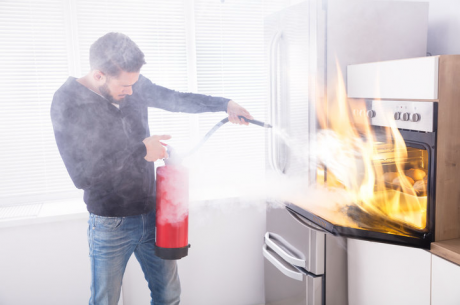After a fire in your Fairfield or Westchester County home or business, some of the hardest decisions you’ll need to make are deciding what to save and what to throw away. It’ll be obvious that some things need to be tossed, but other items may not be so clear cut – are they salvageable or not? You might be torn between wanting to save money and yet also recognizing the need to stay safe. The following are some tips to help you make wise decisions. Remember, you are not alone in this process there are experts that can help along the way.

Food
If food has been exposed to smoke and or firefighting chemicals, throw it away. This includes meat, poultry, fish, eggs, and produce. You’ll also want to toss any opened packages and containers, as well as food packaged in foil, plastic, cardboard, paper, cloth, and screw-topped containers.
Cans of food may outwardly look fine, but high heat may re-cook the food inside. This can activate bacteria and cause the food to spoil, making it unhealthy and dangerous to eat.
But won’t food inside refrigerators and freezers be unharmed?
They might be, but sometimes the seals on them aren’t air-tight, allowing smoke to leak in and damage food. Also, if the fire caused the electricity to fail at your Fairfield or Westchester County property for more than two hours, it’s likely that the food inside spoiled and should be discarded.
Medicines & Cosmetics
The potency of drugs can be destroyed by hot temperatures, according to the Center for Drug Evaluation and Research (CDER). If you’re unsure whether your medicines have been subjected to excessive heat, it’s best to replace them. This is also the case if they’ve been exposed to firefighting chemicals.
When it comes to cosmetics, high temperatures can change their makeup (composition) without any outward signs. This could cause them to damage your hair and skin. Additionally, they can soak up toxic fumes that are inherent with all fires, which isn’t something you want to put on your body.
Clothing

Clothes, bedding, and other fabrics in your Fairfield or Westchester County property can frequently be cleaned and disinfected after a fire if they’ve only been subjected to smoke. But if they’ve been burned or scorched, they should be discarded. Be especially cautious with children’s and babies’ clothing, as their skin and respiratory systems are more sensitive to lingering toxins and chemical residues that may not be fully removed through standard washing.
But what about clothes stored in plastic bags, garment covers, or tightly packed in drawers and closets? Aren’t they protected from smoke deposits and odors?
Unfortunately, no. During a fire, heated air expands rapidly, forcing smoke and soot particles into every possible space—including closets, drawers, and even inside plastic coverings. Once the fire is extinguished and the temperature drops, air begins to circulate again. Garments trapped in plastic, with odor particles now sealed inside, are unable to go through the natural airing-out process. As a result, the odor becomes embedded in the fibers.
Another problem is the plastic itself. Not only does it absorb and trap smoke odors, but it can also react with heat and smoke residues, releasing additional volatile compounds. The plastic should be removed and discarded immediately to prevent further contamination of the fabrics it encased.
Never attempt to clean or salvage any item that could compromise your health or the safety of others in your home. This includes items that are porous, heavily soiled with soot, or were exposed to toxic smoke for prolonged periods. When in doubt—throw it out.
If you live in Fairfield or Westchester County and have questions about what can be salvaged after a fire, or if you need expert fire restoration services, contact PuroClean of Wilton | Ridgefield at 475.277.2400. You can also find helpful tips, safety guidance, and information on our services at our website. We’re here to help you recover safely and restore peace of mind. website.



